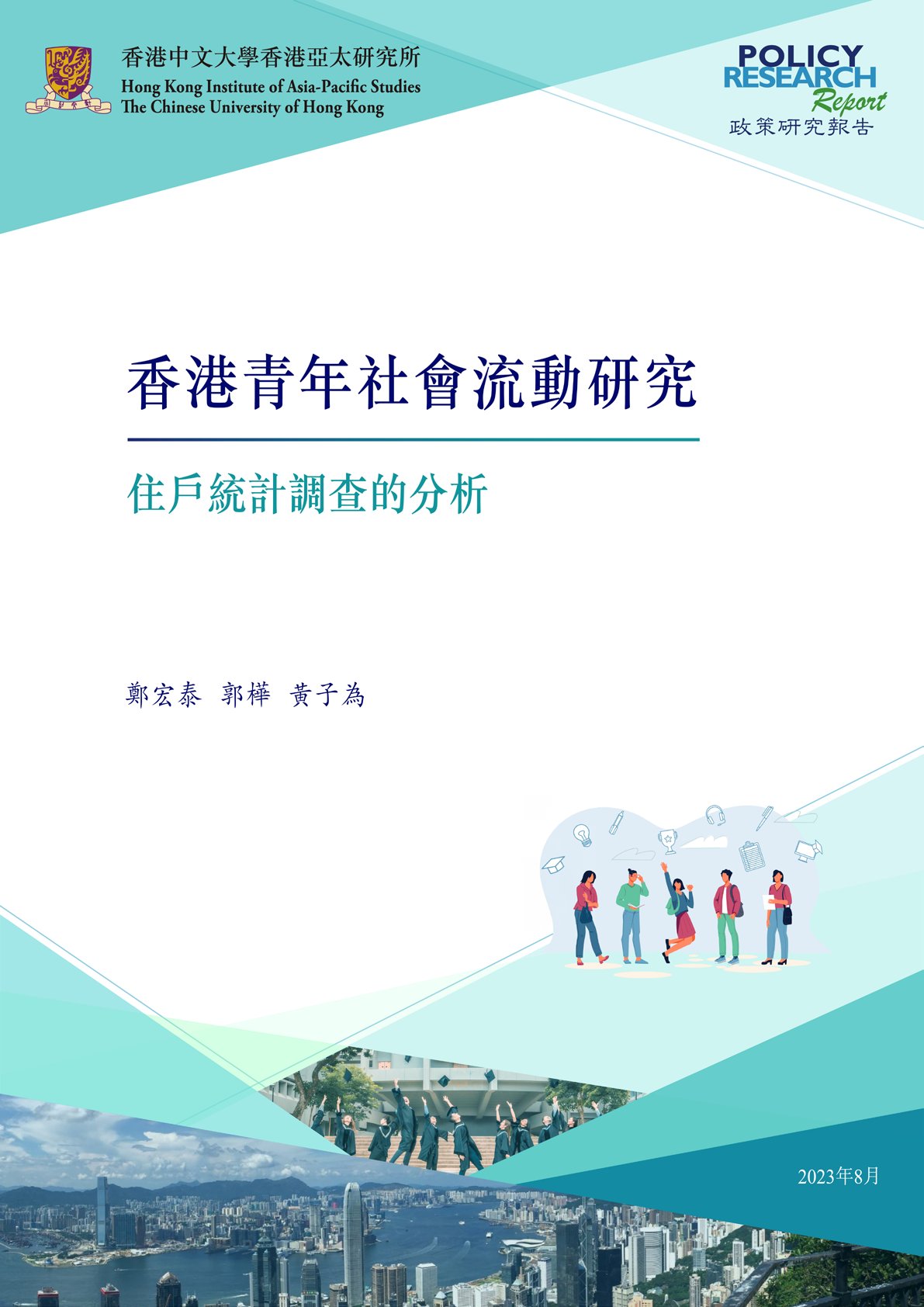| |
 |
|
|
| Sociodemographic Change & Wellbeing |
|
| |
| * Policy Research @ HKIAPS member |
On Youth
|
The social mobility of young people in Hong Kong: An analysis based on household surveys
Investigators: Victor W. T. Zheng*, Hua Guo*, & Kevin T. W. Wong
Funding sources: Policy Research @ HKIAPS |

Young people have been the main supporters and participants in the recent social movements and protests in Hong Kong. Many have suggested that the reason for the anger of young people is the insufficient room for development and a lack of opportunities for upward mobility that they might be experiencing. However, there has been a lack of large-scale and reliable empirical research to confirm this. Thus, the purpose of this research is to explore the central concerns of young people in Hong Kong. Have the economic and social changes throughout the years deprived or hindered the upward mobility of young people? Have those changes resulted in injustice for them? Furthermore, the research aims to determine whether the continuous expansion of higher education has brought about the expected societal effects.
This research focuses on young and middle-aged individuals in Hong Kong and the analysis is conducted from three aspects. First, educational opportunities, which include access to university education and the role of tertiary education in career development. Second, opportunities in the economy, including job opportunities, chances for upward mobility, and the potential for increased income. Third, subjective social class, which refers to the subjective evaluation of their own social standing by young people in Hong Kong.
This research consists of five main themes: 1. The relationship between family and intergenerational social mobility; 2. The relationship between gender and educational opportunities and occupational status; 3. The relationship between tertiary education and youth social mobility; 4. The relationship between elite universities, overseas degrees, and youth social mobility; 5. Social mobility opportunities for immigrants. The data used in this study was obtained from a thematic household survey conducted by the Census and Statistics Department of the HKSAR Government between November 2017 to July 2018. The survey successfully enumerated target respondents in some 10,000 households in accordance with a scientific sampling scheme.
This research was supported by the Policy Innovation and Co-ordination Office and the Social Statistics Branch of the Census and Statistics Department of the HKSAR Government.
Full report:  |

|
|
|
|
|
A longitudinal study of adolescents in Hong Kong (HKLSA)
Investigators: Esther S. C. Ho* (PI) & Stephen W. K. Chiu
Funding sources: General Research Fund (GRF) & Research Grants Council (RGC) |

A longitudinal study of adolescents in Hong Kong (HKLSA) is the first research project of its kind in Hong Kong for tracing the patterns of transition of adolescents from the ages of 15 to 25. It is conducted in four phases: (1) the senior secondary years from the ages of 15 to 18; (2) the 1st to 2nd post-secondary years from ages 18 to 19; (3) the 3rd to 4th post-secondary years from ages 20 to 21; and (4) the 5th to 7th post-secondary years from ages 22 to 25. The participants are students who participated in the Programme for International Student Assessment (PISA) 2012 at age 15. They were born around the time of Hong Kong’s return to Chinese sovereignty in 1997, when major education reforms were launched, which adds to the historic significance of this ten-year longitudinal project.
Prof. Esther S. C. Ho and her research team examined the choice made by students of which higher education institution in Hong Kong to attend. Hong Kong’s higher education system has undergone huge expansion and greater differentiation since 2000. Drawing on semi-structured interview data from the HKLSA and with a detailed classification of the higher education institutions attended by Hong Kong students and of their transition pathways, it was found that the concept of the “institutional habitus” of higher education institutions has manifested itself in three forms: infrastructure, prestige, and culture; and that these have shaped the higher education decisions of students from different socio-economic backgrounds. Moreover, the students’ educational choices reflect an alignment between the habitus of the institution and that of the individual.
|
|
|
|
Young people’s perceptions of the future: A comparison of Hong Kong and Beijing
Investigators: Anthony Y. H. Fung* (PI), Victor Zheng*, & Kevin T. W. Wong (Hong Kong team)
Collaborator: National Institute of Social Development, Chinese Academy of Social Sciences
Funding source: Policy Research @ HKIAPS, CUHK |

The aim of this project is to understand, investigate, and compare the perceptions of young people in Hong Kong and Beijing about their future. A city-wide survey will be conducted simultaneously in Hong Kong and Beijing in 2020, in which a common questionnaire will be used to interview young people between the ages of 15 and 34. Sub-themes of the research will include young people’s self-image, confidence in the society, subjective well-being, career planning, as well as education and job inspiration. This research will shed new light and understanding on the lives of young people and the challenges that they face living in highly globalized metropolitan cities in a borderless world with sophisticated technology.
|
|
|
| |
|
| |
|
|
|
|
|
|
 |
|
|
|